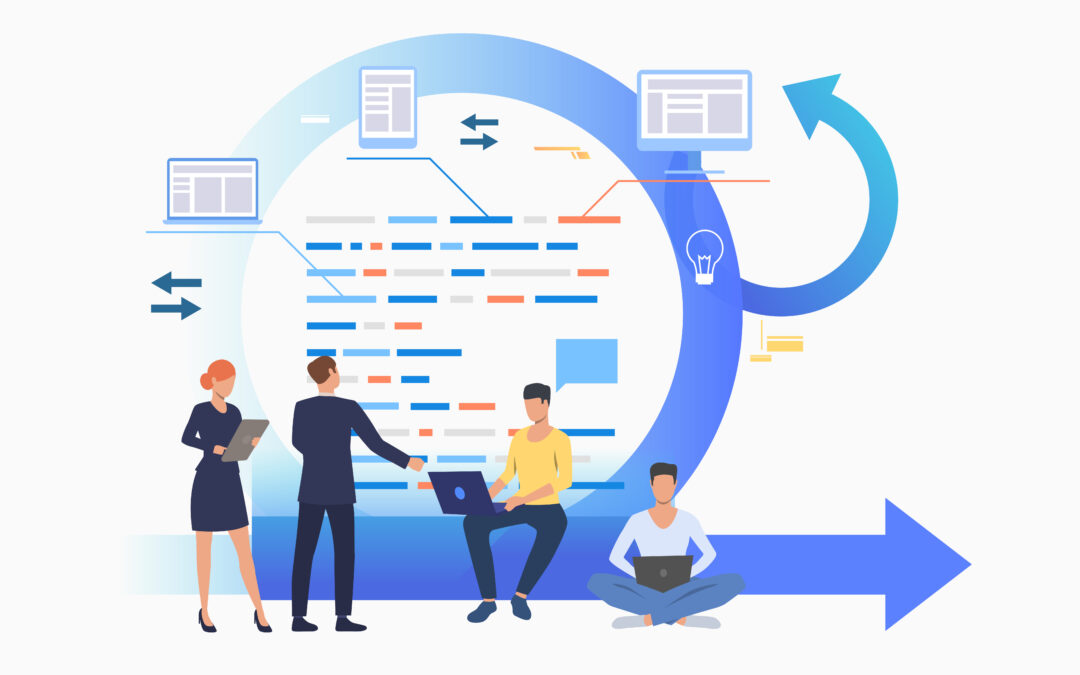
by Huenei IT Services | Dec 31, 2023 | Outsourcing, Software development
Outsourcing is a business solution based on transferring resources and responsibilities to another company dedicated precisely to the provision of those services. In the world of information technology, software outsourcing has become an increasingly common practice, due to the advantages it represents.

The outsourcing process is closely related to the growth and advances in the area of information technology and information systems of organizations, and their impact on commercial, labor and government relations. Globalization, accompanied by the shortening of physical distances and the possibility of working with teams and organizations in different countries, have contributed to the advancement of this practice in the last 20 years. Nowadays, IT services outsourcing is an important solution for companies in various sectors to leverage their services.
Software Outsourcing or In-House Solutions?
It is no longer necessary for a company to have an area for each process, or technological infrastructure, to grow. In addition to a great advantage in cost reduction, the main opportunity offered by the outsourcing of technology services is related to innovation. Companies like Huenei have teams for the ideation, design and development of custom software products to achieve the best solutions for customers.
On the other hand, in-house development often implies that the team becomes outdated with respect to the advances of the industry and the global market. This means that service providers like Huenei can offer innovative and current results that constitute a point of differentiation for client companies.
Additionally, outsourcing in software development gives companies the possibility of focusing their activities on the core of their business, without neglecting the quality of the products developed by suppliers. This is precisely what it is all about, giving the company the possibility to focuse on the development of its strategic activities, free from worrying about adjacent tasks.
Software Outsourcing Modalities
In recent years, different countries have demonstrated a certain level of specialization or mastery in the outsourcing of services in different areas. For example, the provision of financial services for America and other countries around the globe is generally focused on countries such as Mexico, Argentina, India and other Asian countries, operating under the modality of shared services. It is common to find the provision of decentralized contact center services in Colombia or Peru for Spanish-speaking markets. And it is countries like Argentina, Chile and Brazil that are characterized by offering high-level technology and software development services.
In this sense, companies can choose three approaches when selecting an outsourcing service provider based on their location: Onshore, Nearshore or Offshore.
Onshore. Basically, it refers to the contracting of technology services to a company that is located in the same country. An example of this field is a project carried out by Huenei for Aeropuertos Argentina 2000 (Argentina), which was based on the development of a passenger survey system with automatic analysis of responses and presentation of indicators on control panels.
Nearshore. This refers to companies that outsource services to organizations in countries other than their own, but which are close, either geographically, in terms of time zone, language, culture, or other relevant aspects. This generally allows for simpler adoption, less bumpy transfer of knowledge, and fewer hours of training. As an example we could mention the project carried out by Huenei for the Contraloría General de la República (Chile), where a mobile application was developed so that citizens can obtain information on public works carried out by the Government of Chile.
Offshore. Another method of outsourcing developments is Offshore, which consists of hiring the services of companies in countries other than their own, which are distant in terms of culture, geograpgy, location, language, etc. This strategy brings important advantages, like the Nearshore, but it is generally related to a greater reduction in costs, which justifies the cultural, time and language limitations in the relationship of individuals. To illustrate this alternative, we can talk about the development of a voice assistant platform that Huenei made for SoundHound (United States of America); the project consisted in the development of a voice recognition system.
As a conclusion to everything we have been discussing in this article, we can agree that the advancement of technologies and globalization led to the rapid development of the outsourcing industry. More and more companies decide to outsource different services, and software development is one of the main areas affected by this trend. Outsourcing represents great advantages for companies that need software products to achieve their objectives and leverage their business, regardless of the selected modality. If you are looking for outsourcing solutions for your organization, we invite you to learn about our Dedicated Teams, Staff Augmentation, and Turnkey Projects services, to define which is the one that best suits the needs of your project and your company.

by Huenei IT Services | Nov 10, 2023 | Outsourcing, Software development
How to scale up your tech startup with software development outsourcing.
The continuous growth of your startup can be both exciting and scary at the same time. This is what all tech companies dream of, but growth does not come easy. If building a tech startup is tough, trying to scale it is even tougher. Startups can’t scale if they don’t get the skills they need.
If you want your business to grow, then you would probably need to grow the number of people working to deliver value to your customers. In the fast-paced world of technology, scaling up may seem like an easy task. You may think you just need to hire a few more developers or keep on adding new UI designers to your team. But scaling up can be a difficult endeavor, especially for startup companies. Let’s explore a better alternative: nearshore software development outsourcing.
Challenges when scaling a business
At Huenei, we worked with over 100 clients, who managed to achieve their desired results in terms of software product development, which helped them increase the value offered to their clients and, consequently, their economic benefit. Having worked with many different startups, we realized there were a lot of challenges when scaling a business. Here are some of the most common hurdles companies (especially startups) face:
- The opportunity cost of not devoting time to scaling your business.
- Not delegating, and leaving a small group of managers overwhelmed with work.
- Not having enough open headcount for hiring.
- Having the wrong focus.
- Not contracting the right service suppliers.
- Underestimating how much work and resources it would take to scale and to keep that growth going.
Hiring staff vs. outsourcing
If you concluded that you need to increase your work team to offer more value to more clients and achieve better business and economic results, you may be overwhelmed.
At first, hiring new collaborators could seem attractive. It is an alternative chosen by many organizations that are committed to building an internal team. On many occasions, this can bring very good results… But the main challenge that arises is the uncertainty regarding the way of working, the results to be achieved, and the associated costs.
On the one hand, when hiring new teams, people do not know each other and may need some time to start working together harmoniously. In addition, these teams will require constant attention and direction from your company’s management. Following this line, you do not know until you have gone through a couple of specific projects if the results will be optimal. Finally, the costs associated with hiring staff are often very high!

Let us share with you some great news: There’s a way to avoid wasting money and resources on developing in-house teams, so a startup can grow without huge investments. It’s more advantageous from a quality point of view, as well as taking into account the associated costs, to contract a company that takes care of development. If you own or work for a tech startup and you need to boost your operations and your services, you can contract nearshore development services. They will dramatically improve your value proposition and boost your strategy.
In today’s market, where outsourcing is so popular, the options and opportunities for tech startups planning to scale are unlike before.
Grow your business with nearshore software development outsourcing
So, you have a growing business, but how can you scale it up into something bigger? There are countless ways to scale up your company, including hiring personnel, partnering with other businesses, and contracting nearshore software development services.
Rapidly growing tech startups still face the same challenges as small ones: how can you grow on results without growing on costs? As a technology entrepreneur or businessperson, at some point, you will need to be able to scale up your team from a small one to a larger one.
As we have discussed above, outsourcing represents great opportunities and benefits for your company. First of all, your product’s development is performed by a team with extensive experience working on a variety of development projects. In addition, this team adapts its agile way of working to the structure, times, and preferences of your organization. Last but not least, you’ll get better, faster, and more cost-effective results than ever before. Why hire a whole team and grow your payroll when you can get better results with a more efficient investment?

In conclusion, it is important to grow your team to scale up your company, but hiring personnel does come at a cost. You will want to consider the tradeoffs and, most likely, conclude that contracting an outsourced service will offer you the same results (or even better ones), also allowing you to make your costs, your times, and your operations more efficient.
Now it is your turn to make a decision. Outsourcing may be the ideal option that your business needs to grow and scale in a hyper-competitive industry such as technology. Don’t let your business goals get away from you.

by Huenei IT Services | Feb 4, 2023 | Outsourcing
Have you ever wanted to know the difference between Staff Augmentation vs Managed Services? The truth is that to boost your business, it is vital that you know when to use each one. After all, to enhance the performance of your company and your teams!
In this article, we will tell you why you should use Staff Augmentation and when to use Managed Services for your company.
Staff Augmentation vs Managed Services: everything you need to know
First of all, it should be noted that in the IT field it is key to understand the importance of outsourcing personnel. That is to say, more and more companies need services to boost results. And this raises the question of which model to implement, especially between Staff Augmentation vs Managed Services.
But what does each one consist of? Here are the main details.

What is Staff Augmentation?
First and foremost, it is essential to define the Staff Augmentation process. According to Toptal, it consists of the incorporation of a collaborator to the internal staff, but a difference appears: it will not be a “forever” employee, but rather a “help” for a specific period, for certain purposes.
For this reason, these types of workers are not direct company employees. Even though they will work together with the company’s full-time employees, they will not represent an increase in headcount.
And what are its advantages? Well, one of the most important is that it reduces hiring time. When you add “full-time” internal employees to your staff, you will have to go through different hiring processes. In other words, there are usually many interviews and a lot of bureaucracy that you will have to go through.
Here, however, the recruitment time is significantly reduced. Especially if the workers are already familiar with this methodology and are accustomed to working under the Staff Augmentation system. In turn, this implies a new advantage: the flexibility of hiring.
Today’s work is really dynamic and constantly changing. For this reason, using this process means being able to hire new employees for specific tasks. For example, if you have few serverless computing jobs in your IT company, it may not be worthwhile to hire full-time employees.
On the other hand, adhering to this modality will mean that, before any project that may arise for the cloud, you will be able to hire them punctually for this. And, in turn, it will imply an economic benefit. You will not spend money for a position you do not need, and at the same time, you will be able to take advantage of any assignment that arises from a client for this area of specialization.
What are Managed Services?
Let’s move on to Managed Services. According to BMC, this is another effective way of working in a company, which consists of hiring an IT service provider. This situation means that they will take care of managing a company’s operations, whenever specialized support is needed in a particular area.
It is a working model that companies use since it saves the client’s time. In this way, by outsourcing a product to a specialized IT company, you no longer have to worry about deadlines or delivery times, since another company, with its work team, will supervise the processes.
However, some businesspeople sometimes cannot understand the value of this contracting format: companies that want to be on top of every detail of the project may feel insecure. After all, it means delegating all responsibility to the supplier. However, it is always possible to use a technical document to monitor the progress of each delivery. You need to trust in the supplier you are making business with to delegate without second thoughts.
This is a perfect system for those sectors that are not a priority for the company and that demand too much “unnecessary” time. For example, if your company focuses on marketing and advertising, you can delegate IT development to focus 100% on your core business, generating greater economic benefits.
All in all… What Method Should You Choose?
Both work structures have their advantages and can help you achieve your goals more effectively. From our experience, at Huenei we believe that Managed Services is a more appropriate alternative than Augmented Teams for companies whose core business is not software development. Managed Services will allow you to delegate the entire project to a company with extensive experience in managing development processes, such as Huenei. In this way, you can rest assured that the result will be excellent.
In all cases, it will be necessary to hire an ethical, reliable supplier with experience in the market. At Huenei we have been working for years offering our clients the best service. You can review our case studies to learn about our experience in the field.
In short, you already know the difference between Staff Augmentation vs Managed Services. What´s important is that you can use each method in the cases that suit you best. We hope this article has been helpful!







